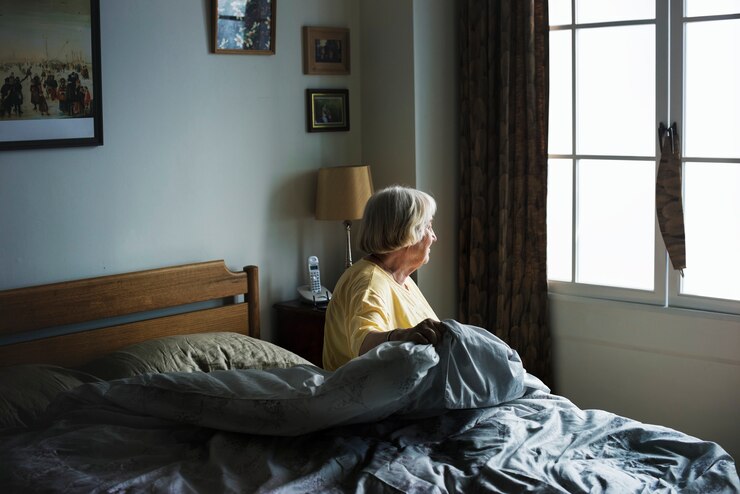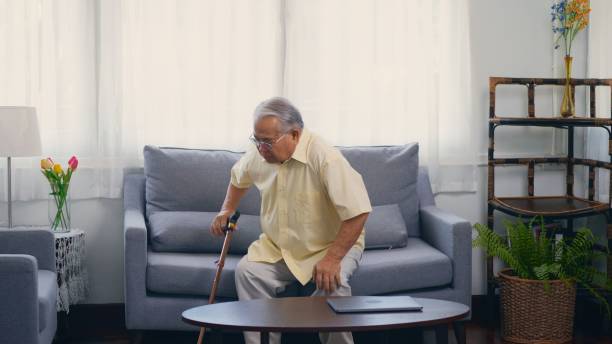Seniors living alone face many challenges, and their senior health risks increase without proper precautions. Senior health risks can range from falls to mental health issues. Understanding these risks and knowing how to prevent them can significantly improve the quality of life for older adults. Furthermore, being aware of these dangers allows seniors and caregivers to take proactive steps. In this article, we’ll explore the most common senior health risks, their dangers, and practical prevention tips to help seniors stay safe and independent.

1. Fall-Related Injuries: A Major Senior Health Risk
Falls are a leading cause of injuries among older adults. They often lead to fractures, head trauma, and long-term disability. Because mobility declines with age, falls become a major concern for seniors living alone. Moreover, falls can significantly reduce confidence and independence.
Prevention Tips
- First, install grab bars in bathrooms and handrails on stairs.
- Also, keep floors free from clutter and use nonslip mats.
- Moreover, wear sturdy, nonslip footwear.
- Engage in balance and strength exercises like yoga or tai chi.
- Lastly, ensure proper lighting throughout the home.
2. Medication Mismanagement: A Hidden Senior Health Risk
Seniors often take multiple medications. Unfortunately, missing doses or mixing medications can lead to serious health problems, including adverse reactions or hospitalizations. In addition, certain medications may cause dizziness, increasing the risk of falls.
Prevention Tips
- To begin with, use a pill organizer or automated medication dispenser.
- Moreover, Set phone reminders or alarms for medication schedules.
- Schedule regular medication reviews with a healthcare provider.
- Lastly, clearly label medications and store them in a secure, accessible place.
3. Social Isolation and Loneliness: A Mental Health Risk
Social isolation can lead to depression, anxiety, and even cognitive decline. Seniors living alone are particularly at risk because they may lack daily interaction with others. Furthermore, loneliness can increase the risk of developing serious illnesses, including heart disease.
Prevention Tips
- First, join community groups, clubs, or senior centers.
- Also, schedule regular phone or video calls with family and friends.
- Consider adopting a pet for companionship.
- In Conclusion engage in volunteer opportunities or hobbies that encourage social interaction.
4. Poor Nutrition and Malnutrition: A Serious Senior Health Risk
Seniors living alone may struggle with meal preparation, leading to poor eating habits and malnutrition. Without proper nutrition, they risk weight loss, vitamin deficiencies, and weakened immunity. Additionally, inadequate hydration can lead to dizziness, confusion, and increased fall risks.
Prevention Tips
- Plan meals in advance and prepare easy, nutritious options.
- Also, consider meal delivery services or home health aides if needed.
- Stay hydrated and include nutrientrich foods in the diet.
- Schedule regular health checkups to monitor nutritional status.
5. Cognitive Decline and Dementia: A Growing Concern
Memory problems and cognitive decline can make independent living unsafe. Seniors living alone may forget important tasks, such as taking medication or paying bills.
Prevention Tips
- Engage in brainstimulating activities like puzzles, reading, or learning new skills.
- In addition, maintain a healthy diet with brainboosting foods like leafy greens and nuts.
- Stay physically active to promote better blood circulation to the brain. Keep emergency contacts easily accessible.
6. Home Safety Risks: Preventable but Dangerous
Seniors are more vulnerable to home accidents, such as fires, carbon monoxide poisoning, and home breaking, due to reduced mobility and slower reaction times.
Prevention Tips
- Install smoke and carbon monoxide detectors and test them regularly.
- Secondly, keep emergency numbers easily accessible.
- Avoid using space heaters or open flames without supervision.
- Lastly, use smart home security systems for added safety.
7. Chronic Disease Management: A Senior Health Priority
Chronic illnesses like diabetes, hypertension, and arthritis require careful management. Seniors living alone may forget medical appointments or struggle with selfcare.
Prevention Tips
- Schedule regular checkups with a healthcare provider.
- Maintain a consistent medication and treatment plan.
- Engage in light physical activities like walking or stretching.
- In conclusion, monitor blood pressure, glucose levels, and other vital signs at home.

8. Mental Health Issues: An Overlooked Senior Health Risk
Depression and anxiety can severely affect a senior’s quality of life. Factors like loneliness, health issues, and financial stress often contribute to mental health decline.
Prevention Tips
- Seek therapy or counseling if experiencing persistent sadness.
- Stay engaged with loved ones and community activities.
- Practice relaxation techniques like meditation or deep breathing.
- Lastly, engage in activities that bring joy and purpose.
Lastly, Living alone as a senior presents challenges, but with the right precautions, it can also be safe and fulfilling. By recognizing senior health risks and addressing them proactively, older adults can maintain their independence while safeguarding their well-being. Moreover, taking small steps today can prevent serious health problems in the future.If you or a loved one lives alone, take these steps today to create a safer and healthier environment.
Do you have any tips or experiences to share? Let us know in the comment below
READ MORE:
- A Comprehensive Guide to Residential Care Homes : This blog provides an in-depth overview of residential care homes, covering their services, benefits, and considerations for choosing the right facility: https://www.caring.com/resources/guide-to-residential-care-homes/
- Are you ready to ensure that your loved ones receive the best care at home? Stay informed and join our community support forum to receive the latest tips on elder care. https://www.formyparents
Disclaimer: This blog provides general information on senior health risks and prevention tips for educational purposes only. While we strive for accuracy, it should not replace professional medical advice, diagnosis, or treatment. Always consult a healthcare provider before making any health-related decisions. Additionally, external links are provided for convenience, but we do not endorse or take responsibility for their content. By using this information, you agree that we are not liable for any outcomes resulting from its application. Stay informed, but always seek expert guidance when needed.
Always, to my BELOVED PARENTS:
Everyday-
I think of you
I miss you
I Love You ❤️

Recent Comments